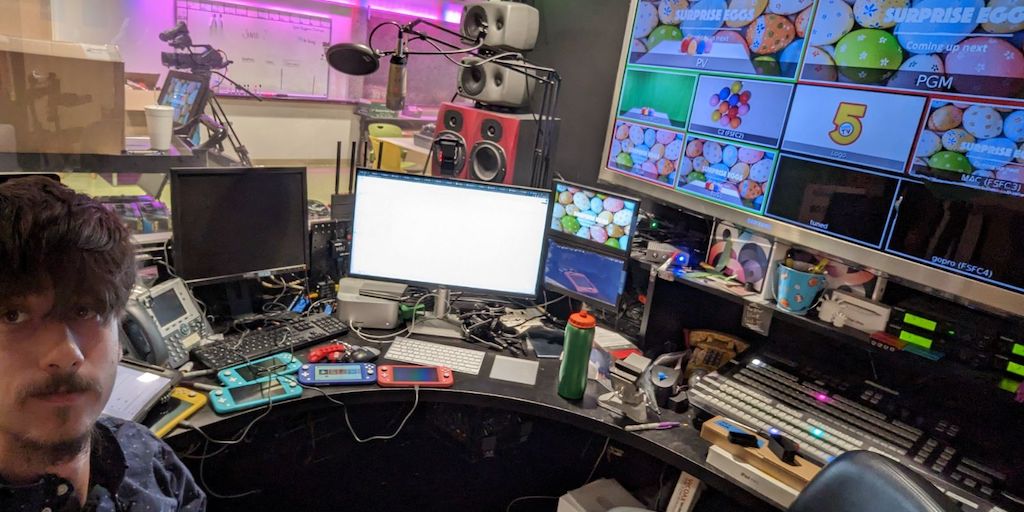When Jacob Lovrinic was growing up, he spent most of his free time inventing and creating—from massive train layouts to motorized grocery carts and a robot that could paint—and started his own 3D printing business. Along the way, he dabbled in MineCraft and other video-based games and making YouTube videos. At school, Lovrinic joined FIRST Robotics at Center Grove schools, culminating in a stint as Operations Captain his senior year. One of the team’s outreach efforts was their summer Radical Robots camp for grades K-5, for which he planned and supervised STEAM activities for kids.
So, although it seemed that he might pursue engineering, it was no surprise to anyone when he decided to study Media Arts and Science (MAS) in college at Luddy Indianapolis. Lovrinic specialized in Digital Storytelling and then added Game Design midway through. A summer job with IUPUI day camp gave him more insight into working with children, although he did not think of it as a career path at the time. He also taught a kids summer camp in robotics at the Johnson County Public Library, adding to his repertoire.
“I’ve always been drawn to charitable applications of technology especially when tackling difficult and demotivating problems with fresh eyes and an ambition for what’s possible,” Lovrinic said.
Early in his senior year, Lovrinic was beginning his job search and was offered a position at Riley Hospital for Children as Technology Coordinator, which he accepted before his last semester. This move actually inspired his Capstone project—a VR game experience for young patients designed to entertain them during treatments, which also served to distract them from painful or boring procedures.
Life at Riley
As Technology Coordinator in the Child Life Zone, Lovrinic is responsible for supporting digital media at the hospital. During COVID this meant finding ways to conduct activities remotely. He hosts Tech Tuesday with Jake online for example, and helps with virtual Bingo and other activities led by staff in the Child Life Zone. He has also supported Riley Foundation initiatives such as the annual Miracle Ride and the Dance Marathon, creating a 3D printed motorcycle and a camera-equipped robot.
During his onboarding and in the year and a half since, Lovrinic has been immersed in the pediatric healthcare environment, learning about dialysis and observing other treatments and surgeries. One of his early projects was to design, CAD, and print a replica of the port device many small patients have in their chest for medicine delivery. When discharged to home, the kids take the replica with them to show their families and educate them on what it is.
Lovrinic’s office at Riley has a large glass window that looks out on the hallway that families take with young patients, where he has installed a small train layout that kids can operate via a magnetic button on the outside of the wall. He has also modified game controllers in patient rooms for single-handed use and has made changes to PowerWheels so that they can be run safely indoors at the hospital.
Lovrinic said, “Even being a relatively young person myself, it’s apparent to me that kids are the future especially because the kids I work with now will be adults in the community in just a few years. It’s important to me that everyone has agency to interact with the built world we live in; that’s why I think STEM activities and adaptive technologies are so important.”
He shared that Riley has been a great place to work because they are open to innovation and will share why something hasn’t worked in the past rather than assuming it can never work in the future. “There are tons of things that just haven’t been tried because it’s never been possible to modify them to the hospital environment before 3D printing, dev boards, and openness to innovation,” he said.
Student Projects
Lovrinic’s latest endeavors at Riley led to his involvement with students from Luddy IUPUI. He stayed in contact with his Capstone mentor and MAS faculty, Zebulun Wood, and when Wood reached out for industry partners for his N420 class, Lovrinic responded with not one, but three projects for collaboration.
Wood said, “Mr. Lovrinic and his peers at Riley were outstanding ‘Client Collaborators’ in partnership with our N420 Multimedia Project Development class. Throughout the semester, he and his colleagues met to present the problem needing solving (by our students), follow up on our students’ proposals, and give feedback frequently to ensure success and happy delivery! Our student teams performed exceptionally well this semester across the board; a special bonus is when we can help the exceptional team at Riley, and the families served. Thanks, Jake, for the pairings! Please keep them coming!”
Media Contact
Joanne Lovrinic
jebehele@iu.edu
317-278-9208


